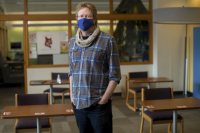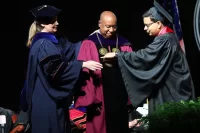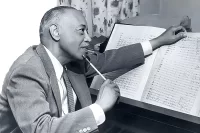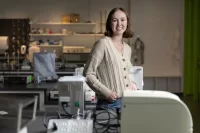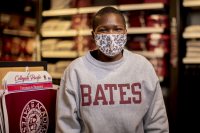
A technology support specialist creates safe ways for students to solve their computer problems. A technical director for theater and dance finds a surprising way to provide offstage guidance.
And an associate director at the Center for Purposeful Work and her colleagues respond to the pandemic by doubling down, being even “more engaged, more intentional, more thoughtful, more purposeful.”
Whether students are feeling down, or need help getting their feet back on the ground, they get the support they need from the Bates staff, whose work helps position students for success in their work with the equally talented and devoted Bates faculty.
Each week for the next five weeks, we’ll continue to share three portraits of Bates staff members who have responded to the needs of our students during a time of crisis. Totaling 21 staffers, from 19 different college offices, these Bates people rise to the challenge when students need somebody — not just anybody.
Keith Hord
A technology support specialist at the Help Desk in Ladd Library, Keith Hord manages 25 students who work in-person and remotely to triage and answer technology questions from the entire campus community.
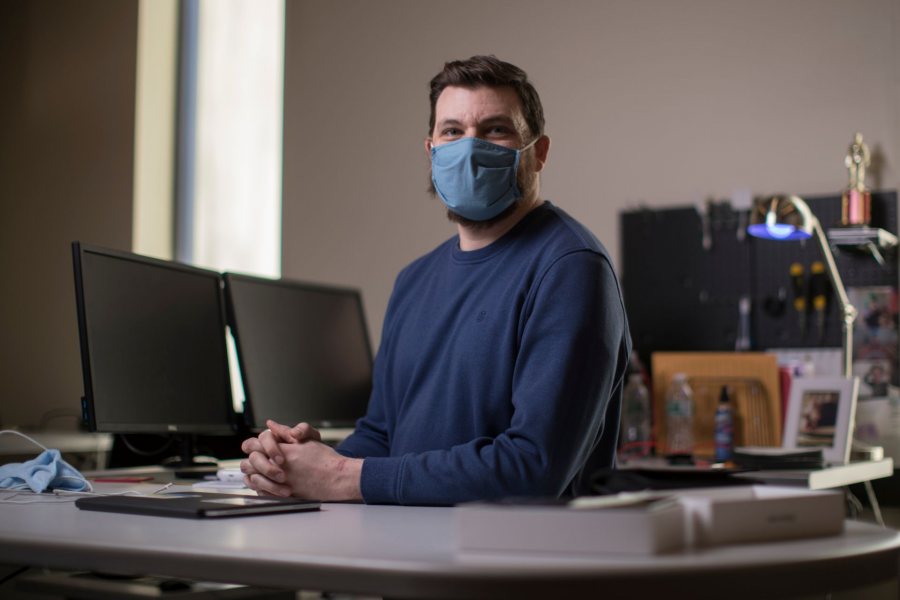
Like so many businesses and operations everywhere, the pandemic has forced the Help Desk to develop no-touch services. So when someone brings their computer or phone or other device to the Help Desk, we can help them with software issues without touching the device. All they need to do is plug a single cord into the computer and we can control it in a safe environment.
We’ve also created and support a virtual desktop infrastructure for our Bates clients. VDI allows students to gain remote access to a computer — one that might have special, proprietary software — without needing to physically visit a computer lab.
With users interacting with us in different ways, we’ve tried to simplify what can be complicated steps for some technology solutions, creating easy-to-follow instructions to expand and evolve our self-service experience.
Effective customer service means you have to meet your client’s expectations. Before the pandemic, folks expected that they would just stop by the Help Desk and wait in line if necessary. That’s not safe in a pandemic, so we’ve educated our users to expect that they’ll need to make appointments with us. We’re also offering more remote support so they don’t need to physically come to the Help Desk at all.
Justin Moriarity
Technical director for the theater and dance departments, Justin Moriarity taught his first theater course at Bates during the fall semester, on stage management.
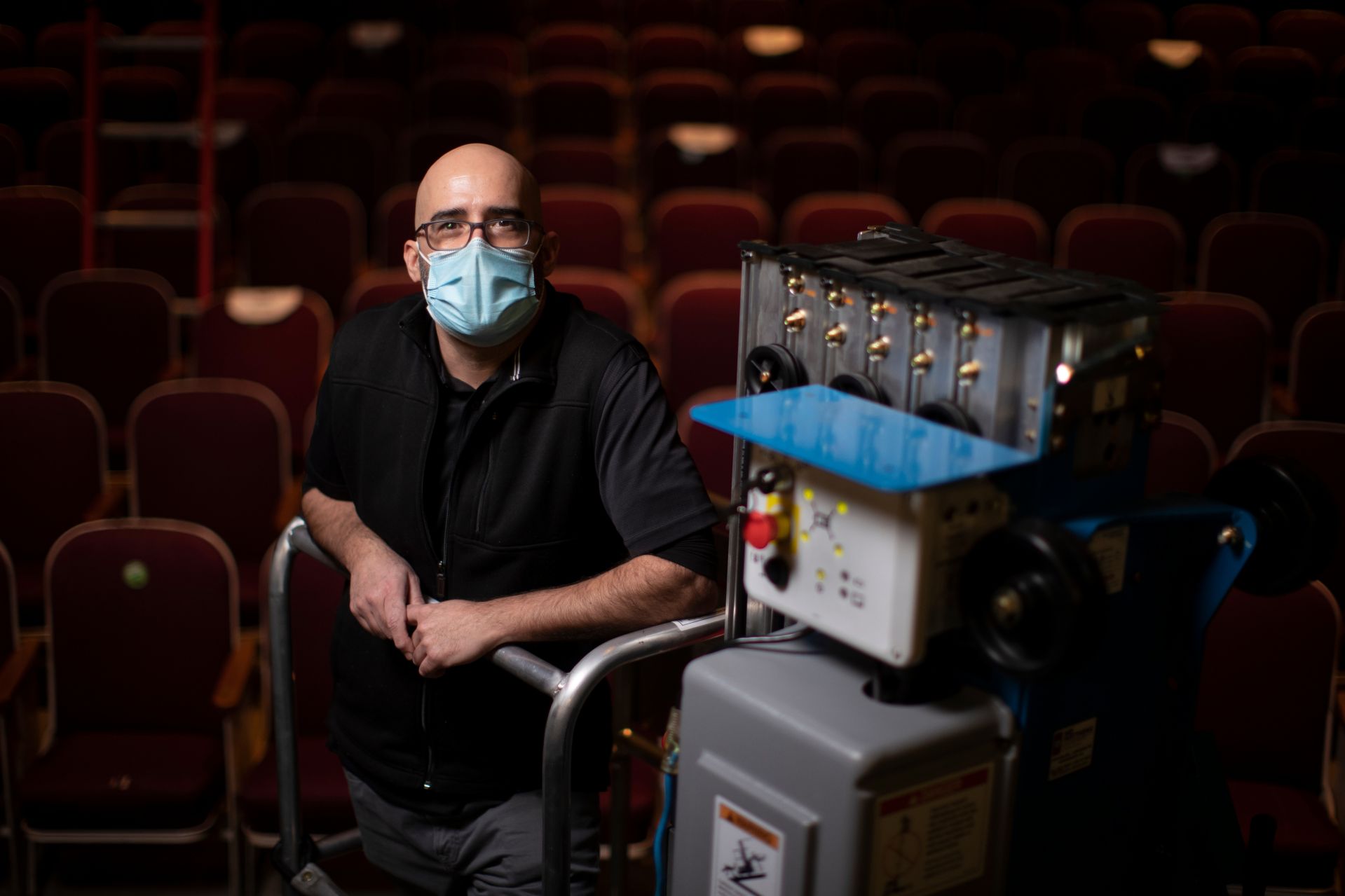
A year ago, on Friday, March 13, we got word that Bates would move to remote learning due to the pandemic.
That evening, with the curtain closing on our in-person semester, around 100 of us gathered together in a brightly lit Gannett Theater to show our support and watch a remarkable group of students stage a far-from-completed production.
The set was half-finished. Lights still needed to be hung and focused. There was so much still to do. No one was ready to go dark, and so we rallied together and did something unforgettable. I remember being unmasked, laughing, crying, packed in a dusty black room with what now would sound like some nightmare super-spreader event. We loved absolutely every moment of it.
Our students, like so many of us, just wanted to feel connected. This is why we love live performance. The space we create together is sacred.
We returned in the fall to a new world — where 16 people will be our new max capacity in Gannett, where air fist bumps replaced the long held embraces. So it was even more important to do what we do best. Treat each student as an individual. Look for ways to help them succeed, but also encourage them to step out of their comfort zones and fail brilliantly.
With limited opportunities for in-person performance during the pandemic, I’ve looked for innovative ways to help students apply some of the concepts to their individual work and personal interests.
One example was in October, when two students in my course, “Stage Management for the Performing Arts,” were an integral part of a public protest on the Coram Terrace — a Bates place that actually served as a venue for public theater long ago.
Because ideas about power, privilege, and difference are built into this course, as well as anti-racist theater practice, we as a class referenced the student protest and connected it to the specific course content we were studying, event production, along with the larger role that artists play in social movements.
We watched “Five Ways of Understanding Black Lives Matter,” from Broadway for Black Lives Matter, in which Frank Leon Roberts references the role artists play and how we are geared for this type of organizing and presentation of thoughts and ideas.
To put it very simply, I try to meet students where they are and respect and honor the knowledge they bring to the work. I’m a guide on the side, as opposed to the sage on stage, offering whatever expertise along the journey. It never gets old and is always rewarding.
Hoi Ning Ngai
Hoi Ning Ngai is wearing two Bates hats these days. She’s an associate director for employer engagement and business advising for the Bates Center for Purposeful Work, and also an interim associate dean with the Office of Intercultural Education.
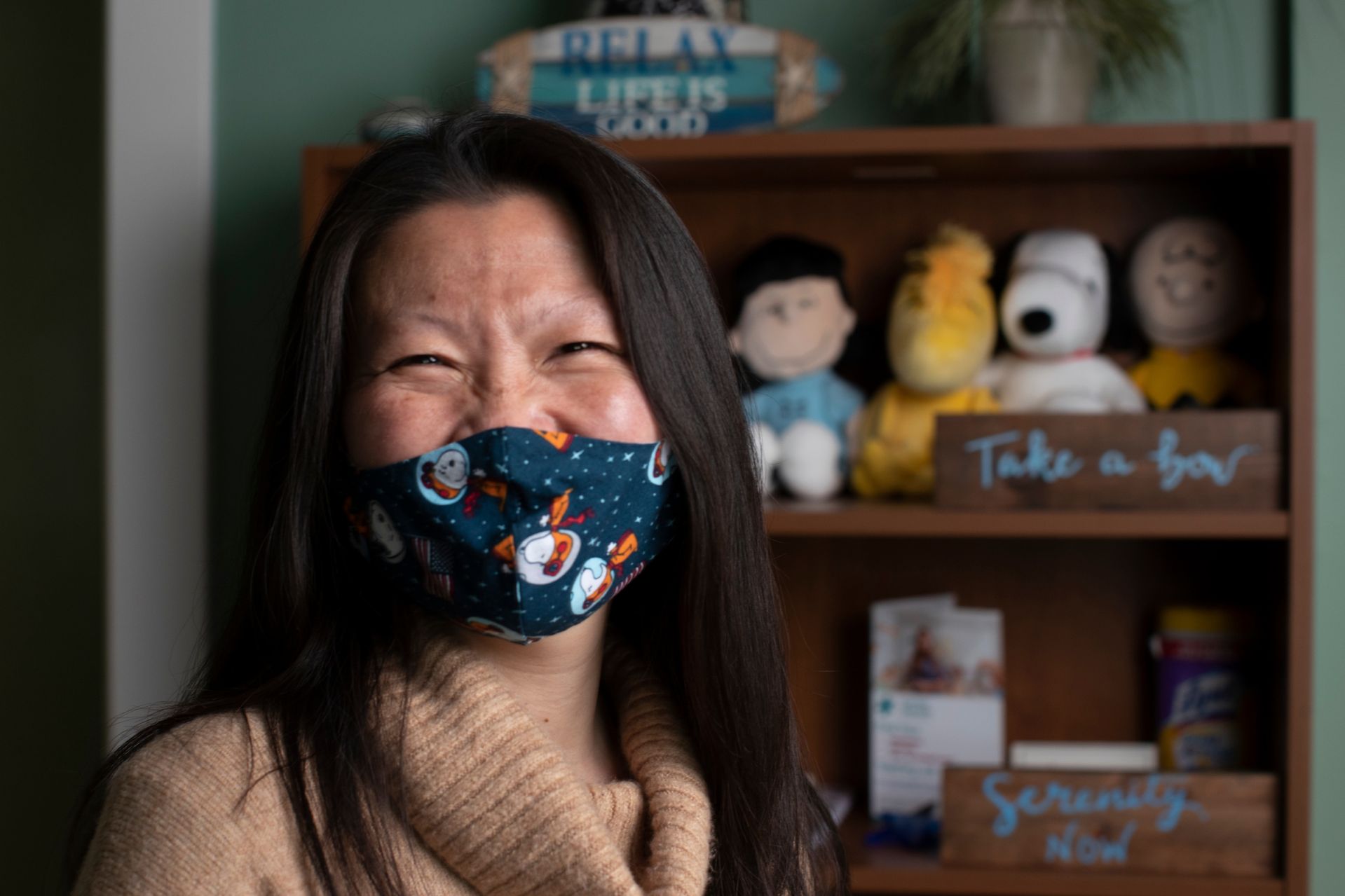
Our motto at Purposeful Work throughout the pandemic has been, “We’re here for you.” But that’s always been our motto. We’ve always been responsive to students and their needs, so the pandemic has simply pushed us to be more ourselves than ever before — more engaged, more intentional, more thoughtful, more purposeful.
Last March, as soon as we learned that Bates would move to remote learning, we pivoted everything we did, from in-person to virtual platforms. In some ways, it’s been a boon.
Students who are off campus for whatever reason have better access to us and our programs, and we’ve been able to “bring to campus” alumni and employers for panels and information sessions without the challenges of travel, time, and cost. We’ve recorded the majority of our programs and placed them on our website for convenient, password-protected access to Bates students.
For individual student appointments, we’ve leaned on Zoom for virtual meetings and, to the degree that the weather permits, the outdoors for in-person meetings. I’ll always remember sitting with a student on the porch at Canham House, our headquarters, as freezing rain came down around us last fall. (I’m pretty weather resilient, but that was my last in-person appointment of the semester!)
I’ve had great Zoom conversations with first-year Bates students from China, Pakistan, and other faraway places. I mean, community is community. Even across the screen, we can create that — at least some of that.
Students have been doing their best to navigate the new way of life at Bates in 2020–21. That said, they’re simply worn out and Zoomed out — as all of us are. Their inboxes are overrun, their eyes are strained, all of their days blend together. This isn’t the college life they signed up for.
We’re helping students craft their COVID resilience stories to share with interviewers for internships and jobs.
There are no perfect solutions to any of these challenges, especially when we’re all experiencing them. What we can do is inject levity when possible, acknowledge the need for rest, listen as students tell us about their struggles, be as responsive as we can be, and connect students to internal and external resources as appropriate.
As our students look ahead to opportunities where they can hone in on what feels purposeful to them, we’re helping them craft their COVID resilience stories to share with interviewers for internships and jobs. Interviewers always ask us to talk about how we’ve dealt with unexpected situations — if the pandemic isn’t the best example, I’m not sure what is.
And that’s what we need to help students focus on: The world continues to turn, so they need to show how they’ve faced ongoing uncertainty with critical reflection and thoughtful action. In so many ways, students have been resilient — we need to help them see and highlight that resilience.
